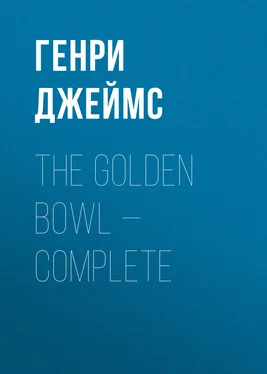Генри Джеймс - The Golden Bowl — Complete
Здесь есть возможность читать онлайн «Генри Джеймс - The Golden Bowl — Complete» — ознакомительный отрывок электронной книги совершенно бесплатно, а после прочтения отрывка купить полную версию. В некоторых случаях можно слушать аудио, скачать через торрент в формате fb2 и присутствует краткое содержание. Жанр: foreign_prose, foreign_antique, на английском языке. Описание произведения, (предисловие) а так же отзывы посетителей доступны на портале библиотеки ЛибКат.
- Название:The Golden Bowl — Complete
- Автор:
- Жанр:
- Год:неизвестен
- ISBN:нет данных
- Рейтинг книги:3 / 5. Голосов: 1
-
Избранное:Добавить в избранное
- Отзывы:
-
Ваша оценка:
- 60
- 1
- 2
- 3
- 4
- 5
The Golden Bowl — Complete: краткое содержание, описание и аннотация
Предлагаем к чтению аннотацию, описание, краткое содержание или предисловие (зависит от того, что написал сам автор книги «The Golden Bowl — Complete»). Если вы не нашли необходимую информацию о книге — напишите в комментариях, мы постараемся отыскать её.
The Golden Bowl — Complete — читать онлайн ознакомительный отрывок
Ниже представлен текст книги, разбитый по страницам. Система сохранения места последней прочитанной страницы, позволяет с удобством читать онлайн бесплатно книгу «The Golden Bowl — Complete», без необходимости каждый раз заново искать на чём Вы остановились. Поставьте закладку, и сможете в любой момент перейти на страницу, на которой закончили чтение.
Интервал:
Закладка:
What was now clear, at all events, for the father and the daughter, was their simply knowing they wanted, for the time, to be together—at any cost, as it were; and their necessity so worked in them as to bear them out of the house, in a quarter hidden from that in which their friends were gathered, and cause them to wander, unseen, unfollowed, along a covered walk in the “old” garden, as it was called, old with an antiquity of formal things, high box and shaped yew and expanses of brick wall that had turned at once to purple and to pink. They went out of a door in the wall, a door that had a slab with a date set above it, 1713, but in the old multiplied lettering, and then had before them a small white gate, intensely white and clean amid all the greenness, through which they gradually passed to where some of the grandest trees spaciously clustered and where they would find one of the quietest places. A bench had been placed, long ago, beneath a great oak that helped to crown a mild eminence, and the ground sank away below it, to rise again, opposite, at a distance sufficient to enclose the solitude and figure a bosky horizon. Summer, blissfully, was with them yet, and the low sun made a splash of light where it pierced the looser shade; Maggie, coming down to go out, had brought a parasol, which, as, over her charming bare head, she now handled it, gave, with the big straw hat that her father in these days always wore a good deal tipped back, definite intention to their walk. They knew the bench; it was “sequestered”—they had praised it for that together, before, and liked the word; and after they had begun to linger there they could have smiled (if they hadn’t been really too serious, and if the question hadn’t so soon ceased to matter), over the probable wonder of the others as to what would have become of them.
The extent to which they enjoyed their indifference to any judgment of their want of ceremony, what did that of itself speak but for the way that, as a rule, they almost equally had others on their mind? They each knew that both were full of the superstition of not “hurting,” but might precisely have been asking themselves, asking in fact each other, at this moment, whether that was to be, after all, the last word of their conscientious development. Certain it was, at all events, that, in addition to the Assinghams and the Lutches and Mrs. Rance, the attendance at tea, just in the right place on the west terrace, might perfectly comprise the four or five persons—among them the very pretty, the typically Irish Miss Maddock, vaunted, announced and now brought—from the couple of other houses near enough, one of these the minor residence Of their proprietor, established, thriftily, while he hired out his ancestral home, within sight and sense of his profit. It was not less certain, either, that, for once in a way, the group in question must all take the case as they found it. Fanny Assingham, at any time, for that matter, might perfectly be trusted to see Mr. Verver and his daughter, to see their reputation for a decent friendliness, through any momentary danger; might be trusted even to carry off their absence for Amerigo, for Amerigo’s possible funny Italian anxiety; Amerigo always being, as the Princess was well aware, conveniently amenable to this friend’s explanations, beguilements, reassurances, and perhaps in fact rather more than less dependent on them as his new life—since that was his own name for it—opened out. It was no secret to Maggie—it was indeed positively a public joke for her—that she couldn’t explain as Mrs. Assingham did, and that, the Prince liking explanations, liking them almost as if he collected them, in the manner of book-plates or postage-stamps, for themselves, his requisition of this luxury had to be met. He didn’t seem to want them as yet for use—rather for ornament and amusement, innocent amusement of the kind he most fancied and that was so characteristic of his blessed, beautiful, general, slightly indolent lack of more dissipated, or even just of more sophisticated, tastes.
However that might be, the dear woman had come to be frankly and gaily recognised—and not least by herself—as filling in the intimate little circle an office that was not always a sinecure. It was almost as if she had taken, with her kind, melancholy Colonel at her heels, a responsible engagement; to be within call, as it were, for all those appeals that sprang out of talk, that sprang not a little, doubtless too, out of leisure. It naturally led her position in the household, as, she called it, to considerable frequency of presence, to visits, from the good couple, freely repeated and prolonged, and not so much as under form of protest. She was there to keep him quiet—it was Amerigo’s own description of her influence; and it would only have needed a more visible disposition to unrest in him to make the account perfectly fit. Fanny herself limited indeed, she minimised, her office; you didn’t need a jailor, she contended, for a domesticated lamb tied up with pink ribbon. This was not an animal to be controlled—it was an animal to be, at the most, educated. She admitted accordingly that she was educative—which Maggie was so aware that she herself, inevitably, wasn’t; so it came round to being true that what she was most in charge of was his mere intelligence. This left, goodness knew, plenty of different calls for Maggie to meet—in a case in which so much pink ribbon, as it might be symbolically named, was lavished on the creature. What it all amounted to, at any rate, was that Mrs. Assingham would be keeping him quiet now, while his wife and his father-in-law carried out their own little frugal picnic; quite moreover, doubtless, not much less neededly in respect to the members of the circle that were with them there than in respect to the pair they were missing almost for the first time. It was present to Maggie that the Prince could bear, when he was with his wife, almost any queerness on the part of people, strange English types, who bored him, beyond convenience, by being so little as he himself was; for this was one of the ways in which a wife was practically sustaining. But she was as positively aware that she hadn’t yet learned to see him as meeting such exposure in her absence. How did he move and talk, how above all did he, or how WOULD he, look—he who, with his so nobly handsome face, could look such wonderful things—in case of being left alone with some of the subjects of his wonder? There were subjects for wonder among these very neighbours; only Maggie herself had her own odd way—which didn’t moreover the least irritate him—of really liking them in proportion as they could strike her as strange. It came out in her by heredity, he amused himself with declaring, this love of chinoiseries; but she actually this evening didn’t mind—he might deal with her Chinese as he could.
Maggie indeed would always have had for such moments, had they oftener occurred, the impression made on her by a word of Mrs. Assingham’s, a word referring precisely to that appetite in Amerigo for the explanatory which we have just found in our path. It wasn’t that the Princess could be indebted to another person, even to so clever a one as this friend, for seeing anything in her husband that she mightn’t see unaided; but she had ever, hitherto, been of a nature to accept with modest gratitude any better description of a felt truth than her little limits—terribly marked, she knew, in the direction of saying the right things—enabled her to make. Thus it was, at any rate, that she was able to live more or less in the light of the fact expressed so lucidly by their common comforter—the fact that the Prince was saving up, for some very mysterious but very fine eventual purpose, all the wisdom, all the answers to his questions, all the impressions and generalisations, he gathered; putting them away and packing them down because he wanted his great gun to be loaded to the brim on the day he should decide to let it off. He wanted first to make sure of the whole of the subject that was unrolling itself before him; after which the innumerable facts he had collected would find their use. He knew what he was about—-trust him at last therefore to make, and to some effect, his big noise. And Mrs. Assingham had repeated that he knew what he was about. It was the happy form of this assurance that had remained with Maggie; it could always come in for her that Amerigo knew what he was about. He might at moments seem vague, seem absent, seem even bored: this when, away from her father, with whom it was impossible for him to appear anything but respectfully occupied, he let his native gaiety go in outbreaks of song, or even of quite whimsical senseless sound, either expressive of intimate relaxation or else fantastically plaintive. He might at times reflect with the frankest lucidity on the circumstance that the case was for a good while yet absolutely settled in regard to what he still had left, at home, of his very own; in regard to the main seat of his affection, the house in Rome, the big black palace, the Palazzo Nero, as he was fond of naming it, and also on the question of the villa in the Sabine hills, which she had, at the time of their engagement, seen and yearned over, and the Castello proper, described by him always as the “perched” place, that had, as she knew, formerly stood up, on the pedestal of its mountain-slope, showing beautifully blue from afar, as the head and front of the princedom. He might rejoice in certain moods over the so long-estranged state of these properties, not indeed all irreclaimably alienated, but encumbered with unending leases and charges, with obstinate occupants, with impossibilities of use—all without counting the cloud of mortgages that had, from far back, buried them beneath the ashes of rage and remorse, a shroud as thick as the layer once resting on the towns at the foot of Vesuvius, and actually making of any present restorative effort a process much akin to slow excavation. Just so he might with another turn of his humour almost wail for these brightest spots of his lost paradise, declaring that he was an idiot not to be able to bring himself to face the sacrifices—sacrifices resting, if definitely anywhere, with Mr. Verver—necessary for winning them back.
Читать дальшеИнтервал:
Закладка:
Похожие книги на «The Golden Bowl — Complete»
Представляем Вашему вниманию похожие книги на «The Golden Bowl — Complete» списком для выбора. Мы отобрали схожую по названию и смыслу литературу в надежде предоставить читателям больше вариантов отыскать новые, интересные, ещё непрочитанные произведения.
Обсуждение, отзывы о книге «The Golden Bowl — Complete» и просто собственные мнения читателей. Оставьте ваши комментарии, напишите, что Вы думаете о произведении, его смысле или главных героях. Укажите что конкретно понравилось, а что нет, и почему Вы так считаете.












